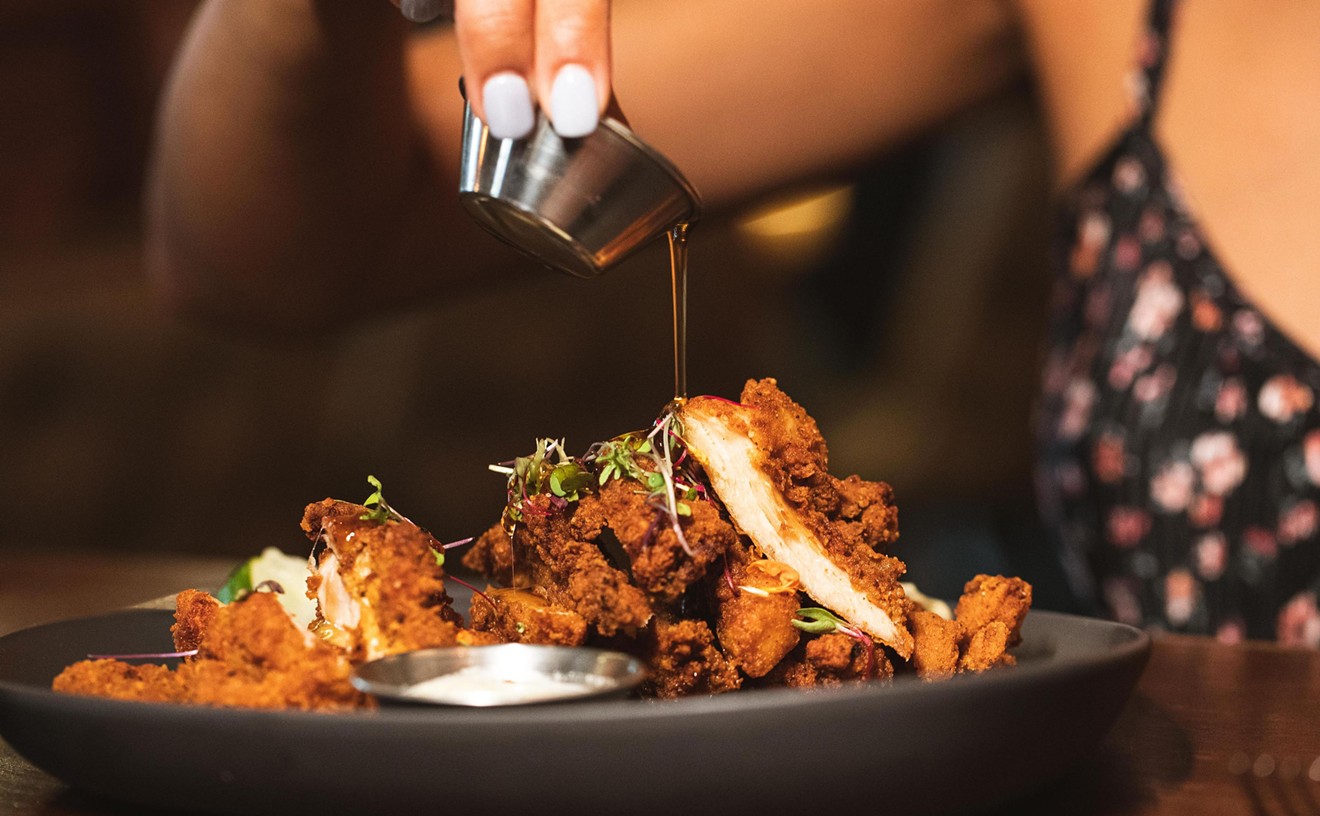Juliette is easy on the eyes. The walls are horizontally paneled in wood, the planks occasionally broken up by illuminated, glass-covered inserts displaying pottery, pumpkins, and sundry organic earth-toned objets d'art. A cylindrical column in the center of the room is wrapped in white drapes and bathed in pink lights that cast a soft rouge glow over the 100-seat room. If Juliette were a woman rather than a restaurant, and a matchmaker were describing her to a potential suitor, he would likely mention good looks and pleasant personality (friendly waitstaff) but would probably also feel compelled to warn she is something of a gold digger (prices here are very high).
Granted, kosher products are more expensive than nonkosher, plus there's the cost of employing a certified mashgiah (an on-site supervisor who determines what is acceptably kosher). But an appetizer salad of fresh green beans and mushrooms is $18. "Vegetables millefeuille," composed of layered eggplant, peppers, zucchini, and yellow squash, is $20. Same cost for a starter of tuna tartare, the chopped fish fresh, zestfully seasoned, and paired with avocado that had been mashed and spiced to a sumptuous guacamolelike state. Good stuff — lean and clean — although walking toward the car after dinner, I couldn't help noticing tuna tartare at Cine Citta Café up the block was $10.95.
Juliette's kosher wines are no bargain either, but there are some seriously sippable reserves from the Baron Herzog Estate. I was going to summon the manager to our table and suggest he try to find a mashgiah knowledgeable about wines who could then double as a sommelier, but my wife advised me to let them handle their own internal affairs.
Let your eyes sashay to the sushi menu for starters, because the cost of a single salad or appetizer from the regular selections can fetch a nine-piece sashimi platter or six-piece sushi sampler or a trio of hand rolls, such as white tuna, hamachi, and spicy salmon. In fact the sushi bar rolls out such dashing presentations of pristine fish you might want to forgo the French fare altogether.
An evening special of stuffed cabbage was worth every cent. It arrived looking nothing like the traditional tomato-sauced, raisin-sweetened east European roll; rather it was shaped like a giant portobello mushroom cap and painted brown with a dense beef demi-glace. The gently braised dome of translucent green leaf came packed with a delicate veal and beef filling and was flecked with minced carrots and onions; underneath were wondrously fluffy mashed potatoes encircled by meaty logs of demi-glaced portobello mushroom.
One of the best of the bistrolike entrées was a small yet succulent duck breast with haricots verts and deliciously herbed, roasted fingerling potatoes. An accompanying honey-ginger sauce was clumpily textured but did contribute a suitably sweet contrast to the bird.
Rib steak brought a neat, petite nine-ounce disk of juicy meat sided by mushy spaghetti regrettably wed with an overly potent, palate-pounding porcini sauce. This spaghetti is also offered as one of four à la carte pastas, the other three composed of penne paired with either pesto, tomato sauce, or tuna, olives, and tomato sauce.
Although many of the main courses proved satisfactory, at these prices the accompaniments seemed pedestrian. Honey-and-lemon-sauced veal medallions, weighing only 6.6 ounces, are served with asparagus and portobello mushrooms — for $43. At Levana, one of New York's premier kosher restaurants, $40 brings a far heftier, first-cut veal chop with Yukon gold mashed potatoes and cumin-scented chanterelles (much classier cousin to the plebian portobello). And while Juliette's $18 hamburger, a half-pounder with French fries and mixed greens, costs less than the $29 burger at Daniel Boulud's DB Bistro Moderne in Manhattan, the meat patty in the latter establishment consoles the high roller with a center of preserved truffles and sides of mache salad and pommes soufflé.
A stout square of sea bass, one of four fish selections, was simply but sure-handedly sautéed in olive oil and aptly matched with a stack of grilled ratatouille vegetables — eggplant, zucchini, yellow squash, red peppers, and red onion (thank goodness we didn't start with the vegetables millefeuille). Other seafood choices are sesame-crusted tuna with teriyaki sauce; grilled salmon with béarnaise sauce; and Dover sole meunire. Maybe Juliette could lower its prices a bit by using locally caught fish instead of flying it in from England.
Warm apple tart, or tarte Tatin, turned out to be a pizzalike disc of partially uncooked dough topped with thinly sliced green apples and a pinch of sugar. Not even a pool of melted vanilla ice cream on top could drown the surprisingly unpleasant flavors. Interestingly the apple pie contained more ice cream than the ice cream cake, a frozen, nutty granolalike substance that resembled an almond-crusted hockey puck and had little to do with ice cream but ultimately proved to be pleasingly palatable. Desserts, as well as other kosher comestibles, are also available at Juliette's handsomely appointed take-out shop next door.
Allow me to play matchmaker for any potential restaurant suitors: Juliette is pretty, the sushi is very pretty, the regular menu is pretty good, and the bill will set you back a pretty penny. That pretty much sums it up.
The Taste of Progress
In the old days, prior to the advent of the digital universe and 24/7 shopping, people barely had time after work to run to the store, pick up a pound of ground beef, rush home, slap it on the grill, and cram it down before falling into bed.
Today we have computers so powerful they can levitate small buildings and so compact they get lost in our coat pockets. We can fax, e-mail, instant-message, download images, and drive around in our cars at the same time. We can make phone calls with our eyeglasses yet still barely have time after work to run to the store, pick up a pound of ground beef, rush home, slap it on the grill, and cram it down before falling into bed.
Isn't progress wonderful?
So, recognizing that no matter how much we advance we always seem to be marching backward, a bunch of smart food types created something called home meal replacements, a smarmy marketing term for dinners that replicate what you might cook at home if you weren't digitally wired, eternally connected, and perpetually exhausted.
This is where Miami's premier upscale market — Epicure — comes in with its impressive array of replacements for that homemade meal you never have the time, energy, or culinary chops to cook. They're inexpensive, require only brief reheating, can be nicely complemented by easy-to-prepare side dishes, and, best of all, taste like real food, not unpronounceable additives.
Okay, this is progress.
Epicure's home meal replacements come in two varieties: freshly made and frozen. Stick with the freshly made. The frozen meals lose too much in translation from freezer to oven to table.
Frozen chicken cacciatore was the product of a struggling home cook, a smidgen of thick, tomatoey sauce with onions, mushrooms, and peppers served over a tender but flabby-skinned quarter chicken with mushy penne and undercooked peas. Braised brisket was the concoction of a terrible home cook, slabs of bland meat smothered in an oddly gelatinous, murky-tasting brown sauce with unpleasant overtones.
Freshly made meals are much better. New England-style clam chowder was damn good, nothing like the fish-flavored paste served at many local restaurants. With a simple salad and a hunk of French bread, it would make a mighty fine dinner. Same goes for pasta e fagioli, the robust Italian soup of cannellini beans and pasta, made with rich chicken stock and plenty of beans and vegetables.
Lasagna was hearty and pretty good too — ground beef, lots of cheese, al dente pasta, yet not quite enough rosemary-scented marinara sauce. Chicken potpie was a little light on the chicken and a little heavy on the dried herbs, but underneath a golden, modestly flaky pastry crust were plenty of carrots, peas, mushrooms, and onions in a savory roux.
You could do a lot worse than finish with Epicure's bread pudding. It is a bit heavy but quite tasty, even more so if you flame a jigger of bourbon and pour it over the top.
If you're not already exhausted, that is. -- Bill Citara
Epicure Market, 1656 Alton Rd, Miami Beach; 305-672-1861. Open daily 9:00 a.m. to 9:00 p.m.











